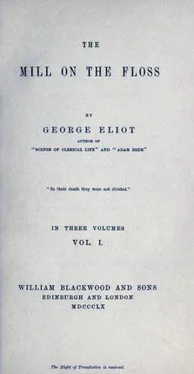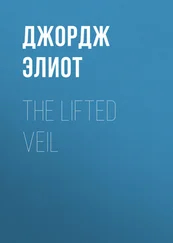"I don't object to the people, but the number," said Stephen, who had recovered himself, and was rather ashamed of his rudeness. "If I voted for a fourth at all, of course it would be you, Phil. But we won't divide the pleasure of escorting the ladies; we'll take it alternately. I'll go the next day."
This incident had the effect of drawing Philip's attention with freshened solicitude toward Stephen and Maggie; but when they re-entered the house, music was proposed, and Mrs. Tulliver and Mr. Deane being occupied with cribbage, Maggie sat apart near the table where the books and work were placed, doing nothing, however, but listening abstractedly to the music. Stephen presently turned to a duet which he insisted that Lucy and Philip should sing; he had often done the same thing before; but this evening Philip thought he divined some double intention in every word and look of Stephen's, and watched him keenly, angry with himself all the while for this clinging suspicion. For had not Maggie virtually denied any ground for his doubts on her side? And she was truth itself; it was impossible not to believe her word and glance when they had last spoken together in the garden. Stephen might be strongly fascinated by her (what was more natural?), but Philip felt himself rather base for intruding on what must be his friend's painful secret. Still he watched. Stephen, moving away from the piano, sauntered slowly toward the table near which Maggie sat, and turned over the newspapers, apparently in mere idleness. Then he seated himself with his back to the piano, dragging a newspaper under his elbow, and thrusting his hand through his hair, as if he had been attracted by some bit of local news in the "Laceham Courier." He was in reality looking at Maggie who had not taken the slightest notice of his approach. She had always additional strength of resistance when Philip was present, just as we can restrain our speech better in a spot that we feel to be hallowed. But at last she heard the word "dearest" uttered in the softest tone of pained entreaty, like that of a patient who asks for something that ought to have been given without asking. She had never heard that word since the moments in the lane at Basset, when it had come from Stephen again and again, almost as involuntarily as if it had been an inarticulate cry. Philip could hear no word, but he had moved to the opposite side of the piano, and could see Maggie start and blush, raise her eyes an instant toward Stephen's face, but immediately look apprehensively toward himself. It was not evident to her that Philip had observed her; but a pang of shame, under the sense of this concealment, made her move from her chair and walk to her mother's side to watch the game at cribbage.
Philip went home soon after in a state of hideous doubt mingled with wretched certainty. It was impossible for him now to resist the conviction that there was some mutual consciousness between Stephen and Maggie; and for half the night his irritable, susceptible nerves were pressed upon almost to frenzy by that one wretched fact; he could attempt no explanation that would reconcile it with her words and actions. When, at last, the need for belief in Maggie rose to its habitual predominance, he was not long in imagining the truth, — she was struggling, she was banishing herself; this was the clue to all he had seen since his return. But athwart that belief there came other possibilities that would not be driven out of sight. His imagination wrought out the whole story; Stephen was madly in love with her; he must have told her so; she had rejected him, and was hurrying away. But would he give her up, knowing — Philip felt the fact with heart-crushing despair — that she was made half helpless by her feeling toward him?
When the morning came, Philip was too ill to think of keeping his engagement to go in the boat. In his present agitation he could decide on nothing; he could only alternate between contradictory intentions. First, he thought he must have an interview with Maggie, and entreat her to confide in him; then, again, he distrusted his own interference. Had he not been thrusting himself on Maggie all along? She had uttered words long ago in her young ignorance; it was enough to make her hate him that these should be continually present with her as a bond. And had he any right to ask her for a revelation of feelings which she had evidently intended to withhold from him? He would not trust himself to see her, till he had assured himself that he could act from pure anxiety for her, and not from egoistic irritation. He wrote a brief note to Stephen, and sent it early by the servant, saying that he was not well enough to fulfil his engagement to Miss Deane. Would Stephen take his excuse, and fill his place?
Lucy had arranged a charming plan, which had made her quite content with Stephen's refusal to go in the boat. She discovered that her father was to drive to Lindum this morning at ten; Lindum was the very place she wanted to go to, to make purchases, — important purchases, which must by no means be put off to another opportunity; and aunt Tulliver must go too, because she was concerned in some of the purchases.
"You will have your row in the boat just the same, you know," she said to Maggie when they went out of the breakfast-room and upstairs together; "Philip will be here at half-past ten, and it is a delicious morning. Now don't say a word against it, you dear dolorous thing. What is the use of my being a fairy godmother, if you set your face against all the wonders I work for you? Don't think of awful cousin Tom; you may disobey him a little."
Maggie did not persist in objecting. She was almost glad of the plan, for perhaps it would bring her some strength and calmness to be alone with Philip again; it was like revisiting the scene of a quieter life, in which the very struggles were repose, compared with the daily tumult of the present. She prepared herself for the boat and at half-past ten sat waiting in the drawing-room.
The ring of the door-bell was punctual, and she was thinking with half-sad, affectionate pleasure of the surprise Philip would have in finding that he was to be with her alone, when she distinguished a firm, rapid step across the hall, that was certainly not Philip's; the door opened, and Stephen Guest entered.
In the first moment they were both too much agitated to speak; for Stephen had learned from the servant that the others were gone out. Maggie had started up and sat down again, with her heart beating violently; and Stephen, throwing down his cap and gloves, came and sat by her in silence. She thought Philip would be coming soon; and with great effort — for she trembled visibly — she rose to go to a distant chair.
"He is not coming," said Stephen, in a low tone. "I am going in the boat."
"Oh, we can't go," said Maggie, sinking into her chair again. "Lucy did not expect — she would be hurt. Why is not Philip come?"
"He is not well; he asked me to come instead."
"Lucy is gone to Lindum," said Maggie, taking off her bonnet with hurried, trembling fingers. "We must not go."
"Very well," said Stephen, dreamily, looking at her, as he rested his arm on the back of his chair. "Then we'll stay here."
He was looking into her deep, deep eyes, far off and mysterious at the starlit blackness, and yet very near, and timidly loving. Maggie sat perfectly still — perhaps for moments, perhaps for minutes — until the helpless trembling had ceased, and there was a warm glow on her check.
"The man is waiting; he has taken the cushions," she said. "Will you go and tell him?"
"What shall I tell him?" said Stephen, almost in a whisper. He was looking at the lips now.
Maggie made no answer.
"Let us go," Stephen murmured entreatingly, rising, and taking her hand to raise her too. "We shall not be long together."
Читать дальше












